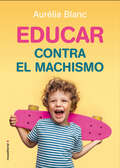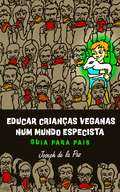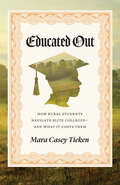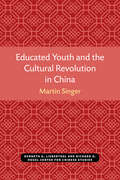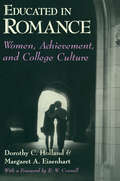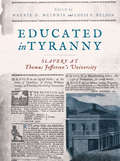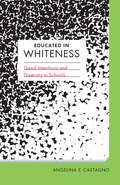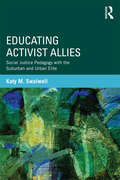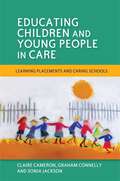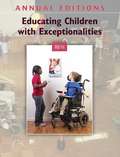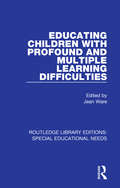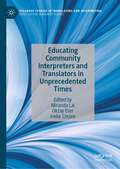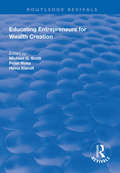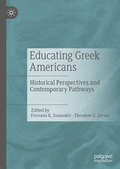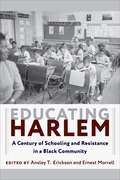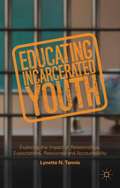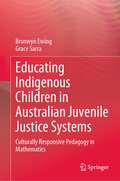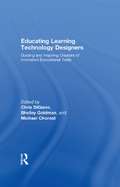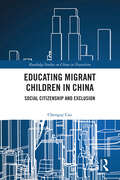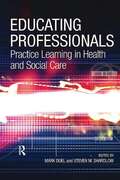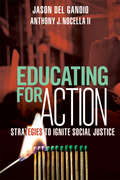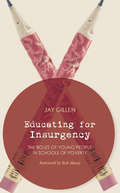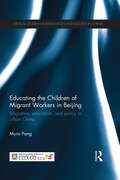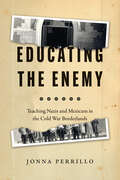- Table View
- List View
Educar contra el machismo
by Aurélia BlancEl primer libro de educación no sexista para niños. Un libro que lleva el feminismo a la vida familiar. Durante décadas, hemos reflexionado sobre el significado de la feminidad, sobre la educación de nuestras hijas en el feminismo, a quienes queremos ver orgullosas y emancipadas: luchamos en la escuela, en la calle, en la familia, para darles las mismas oportunidades que a los niños y para combatir los clichés. Pero seguimos criando a nuestros hijos bajo el mismo molde patriarcal que antes, como si pudiéramos deconstruir el sexismo sin preguntarnos acerca de la masculinidad. A través de estudios científicos y testimonios de profesionales, Aurélia Blanc, madre joven y periodista, reúne todas las herramientas para ayudar a los padres a criar a sus hijos de una manera igualitaria en cuanto al género. Blanc describe cómo nuestros hijos, encerrados con viejos grilletes masculinos, sufren la represión de su ser, sus sentimientos y sus deseos reales. Adoptar una educación feminista es dar a nuestros hijos la oportunidad de desarrollar su singularidad y cultivar la verdadera libertad. Un libro que da las claves para crear niños felices, libres y que vivan la igualdad como el único camino y que detecta y examina las bases del «sexismo benevolente» que desafortunadamente aún vivimos, ofreciéndonos las bases para romper ciertos roles impuestos e ideas machistas conscientes e inconscientes, evitando que contaminen nuestro imaginario y el de nuestros pequeños. Un libro que educa en la igualdad, en la vida afectiva y sexual y en la lucha contra la influencia negativa de los estereotipos, que ayudará a los padres a que sus hijos cuestionen su entorno y aprendan a responder ante actitudes sexistas, aprendiendo sin tabúes en una educación que favorezca el encuentro con la otredad.Un libro fundamental para que tu hijo se respete a sí mismo y a todos los demás y para que se convierta en un hombre libre.
Educar crianças veganas num mundo especista: Guia para pais
by Joseph de la Paz Maria"Quando embala o seu bebé, tem literalmente o futuro da humanidade nas suas mãos". Criar os nossos filhos de acordo com os nossos valroes devia ser a coisa mais natural e simples do mundo. Contudo, viemos numa sociedade que vê o veganismo com suspeição e que continua imersa em mitos especistas e nutricionais fruto do passado. Por isso, nós que somos mães e pais veganos, enfrentamos uma infinidade de situações diversas que exigem que tenhamos uma preparação especial. Este livro oferece apoio teórico e prático a esses pais. Não se centra na nutrição - apenas existe um capítulo com regras e conselhos gerais a esse respeito -, mas em todos os aspetos educativos, emocionais e sociais associados a ter um filho e a educá-lo sem trair as nossas crenças. Depois de dois anos a conversar e a entrevistar centenas de mães e pais veganos de todo o mundo, a interagir com as crianças do infantário onde trabalha e a ver as suas duas filhas crescer, o autor apresenta um livro direto, cheio de informações e inspiração. Nele poderá encontrar: •como otimizar o ambiente social em que o nosso pequeno irá crescer •como transmitir uma educação humana integral, coerente com o veganismo •como incutir os valores da igualdade animal e o respeito pela vida e pela liberdade •como completar o círculo com uma correta consciencialização acerca da nutrição e do respeito pelo meio ambiente •como explicar o veganismo e o especismo a uma criança •como resolver situações do dia-a-dia na escola, no parque ou em casa dos avós •como fazer a transição para o veganismo quando os seus filhos já comeram produtos de origem animal •como enfrentar a situação se o seu parceiro não for vegan •conselhos práticos de mães, pais e filhos veganos de diversos países •recursos úteis, desde informação nutricio
Educated Out: How Rural Students Navigate Elite Colleges—And What It Costs Them
by Mara Casey TiekenThrough the stories of nine rural, first-generation students and their families, Educated Out shows how geography shapes college opportunities, from admission to postgraduation options. A former third-grade teacher in rural Tennessee, education researcher Mara Casey Tieken watched as her former students graduated high school. She was shocked at how few were heading to college—and none were going to elite four-year schools. These students were representative of a larger national phenomenon: In 2021, 31 percent of rural adults aged twenty-five and older held a postsecondary degree, compared to 45 percent of urban adults, and rural students are especially unlikely to pursue degrees from private, selective schools. Why, Tieken wondered? And what happens to the handful of rural students who do attend elite colleges, colleges that may feel worlds away from home? Tieken addresses these questions in Educated Out—a study that shows how geography shapes rural, first-generation students’ access to college, their college experiences, and their postgraduation plans and opportunities. Tieken closely follows a group of nine students for their college years and beyond at an elite New England private school that she calls Hilltop. Interviews with these students reveal the critical moments in the students’ educational careers when their rural origins mattered most: when applying to college, she shows how students are hindered by limited college counseling resources. Once on campus, they learn that many of the school’s opportunities are not available to them: they cannot access spring break trips, job networks, or low-pay-but-important internships. These students discover that home and college are very different worlds with different academic, social, and political climates—and, over time, they start to question both. As they near graduation and navigate a job market in which the highest-paying and most prestigious opportunities are located in urban centers, they begin to feel the complicated burden of their schooling: they’ve been “educated out.” Their stories show the costs of college for rural students: If they do not pursue higher education, they lose the opportunity for social mobility; if they do, they face a more permanent departure. These costs are individual, but rural families and communities also suffer—they lose young people with talent and skills. In addition to advocating for a higher education landscape that truly includes rural students, Tieken critiques a system that requires people to leave their rural homes in search of opportunities. Our current economy depends on inexpensive rural labor. Without meaningful change, some students will have to make the impossible decision to leave home—and far more will remain there, undereducated and overlooked. Both engaging and accessible, Educated Out presents important and timely questions about rurality, identity, education, and inequality.
Educated Youth and the Cultural Revolution in China (Michigan Monographs In Chinese Studies #10)
by Martin SingerThe Cultural Revolution was an emotionally charged political awakening for the educated youth of China. Called upon by aging revolutionary Mao Tse-tung to assume a “vanguard” role in his new revolution to eliminate bourgeois revisionist influence in education, politics, and the arts, and to help to establish proletarian culture, habits, and customs, in a new Chinese society, educated young Chinese generally accepted this opportunity for meaningful and dramatic involvement in Chinese affairs. It also gave them the opportunity to gain recognition as a viable and responsible part of the Chinese polity. In the end, these revolutionary youths were not successful in proving their reliability. Too “idealistic” to compromise with the bourgeois way, their sense of moral rectitude also made it impossible for them to submerge their factional differences with other revolutionary mass organizations to achieve unity and consolidate proletarian victories. Many young revolutionaries were bitterly disillusioned by their own failures and those of other segments of the Chinese population and by the assignment of recent graduates to labor in rural communes. Educated Youth and the Cultural Revolution in China reconstructs the events of the Cultural Revolution as they affected young people. Martin Singer integrates material from a range of factors and effects, including the characteristics of this generation of youths, the roles Mao called them to play, their resentment against the older generation, their membership in mass organizations, the educational system in which they were placed, and their perception that their skills were underutilized. To most educated young people in China, Singer concludes, the Cultural Revolution represented a traumatic and irreversible loss of political innocence, made yet more tragic by its allegiance to the unsuccessful campaign of an old revolutionary to preserve his legacy from the inevitable storms of history.
Educated in Romance: Women, Achievement, and College Culture
by Dorothy C. Holland Margaret A. EisenhartIs romance more important to women in college than grades are? Why do so many women enter college with strong academic backgrounds and firm career goals but leave with dramatically scaled-down ambitions? Dorothy C. Holland and Margaret A. Eisenhart expose a pervasive "culture of romance" on campus: a high-pressure peer system that propels women into a world where their attractiveness to men counts most.
Educated in Tyranny: Slavery at Thomas Jefferson’s University
by Andrew Johnston Kirt von von Daacke Louis P. Nelson Maurie D. McInnis Benjamin Ford James Zehmer Jessica E. SewellFrom the University of Virginia’s very inception, slavery was deeply woven into its fabric. Enslaved people first helped to construct and then later lived in the Academical Village; they raised and prepared food, washed clothes, cleaned privies, and chopped wood. They maintained the buildings, cleaned classrooms, and served as personal servants to faculty and students. At any given time, there were typically more than one hundred enslaved people residing alongside the students, faculty, and their families. The central paradox at the heart of UVA is also that of the nation: What does it mean to have a public university established to preserve democratic rights that is likewise founded and maintained on the stolen labor of others? In Educated in Tyranny, Maurie McInnis, Louis Nelson, and a group of contributing authors tell the largely unknown story of slavery at the University of Virginia. While UVA has long been celebrated as fulfilling Jefferson’s desire to educate citizens to lead and govern, McInnis and Nelson document the burgeoning political rift over slavery as Jefferson tried to protect southern men from anti-slavery ideas in northern institutions. In uncovering this history, Educated in Tyranny changes how we see the university during its first fifty years and understand its history hereafter.
Educated in Whiteness: Good Intentions and Diversity in Schools
by Angelina E. CastagnoEducators across the nation are engaged in well-meaning efforts to address diversity in schools given the current context of NCLB, Race to the Top, and the associated pressures of standardization and accountability. Through rich ethnographic accounts of teachers in two demographically different secondary schools in the same urban district, Angelina E. Castagno investigates how whiteness operates in ways that thwart (and sometimes co-opt) even the best intentions and common sense—thus resulting in educational policies and practices that reinforce the status quo and protect whiteness rather than working toward greater equity.Whereas most discussions of the education of diverse students focus on the students and families themselves, Educated in Whiteness highlights the structural and ideological mechanisms of whiteness. In schools, whiteness remains dominant by strengthening and justifying the status quo while simultaneously preserving a veneer of neutrality, equality, and compassion. Framed by critical race theory and whiteness studies, this book employs concepts like interest convergence, a critique of liberalism, and the possessive investment in whiteness to better understand diversity-related educational policy and practice.Although in theory most diversity-related educational policies and practices are intended to bring about greater equity, too often in practice they actually maintain, legitimate, and so perpetuate whiteness. Castagno not only sheds light on this disconnect between the promises and practices of diversity-related initiatives but also provides insight into why the disconnect persists.
Educating Activist Allies: Social Justice Pedagogy with the Suburban and Urban Elite (Critical Social Thought)
by Katy M. SwalwellA CHOICE Outstanding Academic Title 2013! Educating Activist Allies offers a fresh take on critical education studies through an analysis of social justice pedagogy in schools serving communities privileged by race and class. By documenting the practices of socially committed teachers at an urban private academy and a suburban public school, Katy Swalwell helps educators and educational theorists better understand the challenges and opportunities inherent in this work. She also examines how students responded to their teachers’ efforts in ways that both undermined and realized the goals of social justice pedagogy. This analysis serves as the foundation for the development of a curricular framework helping students to foster an "Activist Ally" identity: the skills, knowledge, and dispositions necessary to negotiate privilege in ways that promote justice. Educating Activist Allies provides a powerful introduction to the ways in which social justice curricula can and should be enacted in communities of privilege.
Educating Children and Young People in Care: Learning Placements and Caring Schools
by Claire Cameron Graham Connelly Sonia JacksonChildren and young people in care rarely match the academic achievements of their peers and policy and procedures to address this inequality have not yet remedied the problem. Drawing on ideas from social pedagogy, the authors present a new approach - learning placements and caring schools. They show that education and care must be considered integral to both out of home placements and schools. Packed with practice examples, it includes chapters on early childhood education and care, as well as alternatives to school and higher education, covering everything from birth up to the age of 25. It highlights the potential benefits of a range of learning opportunities, from drama and outdoor activities, to bedtime stories and mentoring as well as providing support for teachers in their role as carer. Chapters include key points, case studies, practice points and useful resources. This is a unique evidence-informed practical guide for students and professionals in the fields of social work, social care, psychology and education.
Educating Children with Exceptionalities 10/11 (20th edition)
by Karen L. FreibergThe Annual Editions series provides students with convenient, inexpensive access to current, carefully selected articles from the public press. Annual Editions: Educating Children with Exceptionalities 10/11 is an easy-to-use reader that presents articles on important topics such as fitting in, severe disabilities, gifted and talented, and many more.
Educating Children with Profound and Multiple Learning Difficulties (Routledge Library Editions: Special Educational Needs #60)
by Jean WareFirst published in 1994. The authors of this book aim to make recent developments in psychological research accessible to teachers of pupils with profound and multiple learning difficulties. The authors present their own and related research in the areas of assessment, curriculum, and teaching techniques, taking care to point out the range, relevance and limitations of findings in the context of pupils with PMLDs. As this is an area of acute training need, the book will meet a real need for a broad current perspective on good practice. The needs of pupils at primary and secondary levels are considered and case studies are used to exemplify some of the challenges and approaches discussed.
Educating Community Interpreters and Translators in Unprecedented Times (Palgrave Studies in Translating and Interpreting)
by Miranda Lai Oktay Eser Ineke CrezeeThis edited book features contributions from interpreter and translator educators globally, in which they discuss changes to teaching, assessment and practice as a result of the COVID-19 pandemic. The chapters provide a comprehensive picture of educators’ responses to challenges and opportunities. The book will be of interest to students, researchers and educators, as well as government language policymakers and stakeholders of translation and interpreting agencies.
Educating Entrepreneurs for Wealth Creation (Routledge Revivals)
by Peter Rosa Michael G. Scott Heinz KlandtPublished in 1998, this book moves away from the basic education of entrepreneurs to new models and methods, often running in cooperation with orthodox management courses in institutes of higher education. The papers in this book develop themes, models and concepts for the education of wealth creating entrepreneurs.
Educating Greek Americans: Historical Perspectives and Contemporary Pathways
by Theodore G. Zervas Fevronia K. SoumakisThis edited collection considers Greek American formal and informal educational efforts, institutions, and programs, broadly conceived, as they evolved over time throughout the United States. The book’s focus on Greek Americans aims to highlight the vast array of educational responses to local needs and contexts as this distinct, yet, heterogeneous immigrant community sought to maintain its linguistic, cultural, and religious heritage for over one hundred years. The chapters in this volume amend the scholarly literature that thus far has not only overlooked Greek American educational initiatives, but has also neglected to recognize and analyze the community’s persistence in sustaining them. This book is an important contribution to an understanding of Greek Americans’ long overdue history as a significant diaspora community within an American context.
Educating Harlem: A Century of Schooling and Resistance in a Black Community
by Ernest Morrell Ansley T. EricksonOver the course of the twentieth century, education was a key site for envisioning opportunities for African Americans, but the very schools they attended sometimes acted as obstacles to black flourishing. Educating Harlem brings together a multidisciplinary group of scholars to provide a broad consideration of the history of schooling in perhaps the nation’s most iconic black community.The volume traces the varied ways that Harlem residents defined and pursued educational justice for their children and community despite consistent neglect and structural oppression. Contributors investigate the individuals, organizations, and initiatives that fostered educational visions, underscoring their breadth, variety, and persistence. Their essays span the century, from the Great Migration and the Harlem Renaissance through the 1970s fiscal crisis and up to the present. They tell the stories of Harlem residents from a wide variety of social positions and life experiences, from young children to expert researchers to neighborhood mothers and ambitious institution builders who imagined a dynamic array of possibilities from modest improvements to radical reshaping of their schools. Representing many disciplinary perspectives, the chapters examine a range of topics including architecture, literature, film, youth and adult organizing, employment, and city politics. Challenging the conventional rise-and-fall narratives found in many urban histories, the book tells a story of persistent struggle in each phase of the twentieth century. Educating Harlem paints a nuanced portrait of education in a storied community and brings much-needed historical context to one of the most embattled educational spaces today.
Educating Incarcerated Youth
by Lynette N. TannisThis book explores the perceptions and role of juvenile justice educators. Through researching the support structures of educational facilities and analysing the positive features of these learning environments, Tannis evaluates how best to educate incarcerated young people and prepare them for their transition back into society.
Educating Indigenous Children in Australian Juvenile Justice Systems: Culturally Responsive Pedagogy in Mathematics
by Bronwyn Ewing Grace SarraThis book addresses key issues in the context of the national policy of educating children accused of crimes in Juvenile Courts in Australia. For several decades, National and State Governments in Australia have struggled to define education, constantly seeking to improve the way society applies the concept. This book presents an accurate portrayal of consequences of the education policy of trying to educate troubled children and young people in trouble with the law. It describes the work of juvenile detention centre mathematics teachers and their teaching contexts. It portrays teachers as learners, who ventured with researchers with a theoretical perspective. This book focuses on culturally responsive pedagogies that seek to understand the ways Indigenous children and young people in juvenile detention make sense of their mathematical learning, which, until the time of detention, has been plagued by failure. It examines how the underperformance of Aboriginal and Torres Strait Islander students, and students from low socioeconomic backgrounds are strong determinants of their overrepresentation in the juvenile justice system in Australia. This book presents the argument that if the students’ literacy and numeracy levels can be improved, there is opportunity to build better futures away from involvement in the juvenile justice system and towards productive employment to improve life chances.
Educating Learning Technology Designers: Guiding and Inspiring Creators of Innovative Educational Tools
by Michael Chorost Shelley Goldman Chris DiGianoWhat knowledge and skills do designers of learning technologies need? What is the best way to train them to create high-quality educational technologies? Distilling the wisdom of expert instructors and designers, this cutting-edge guide offers a clear, accessible balance of theory and practical examples. This cutting-edge guide: synthesizes learning, instructional design, and educational technology perspectives on learning-centered technology — highlighting how interdisciplinary work is driving the fields of the learning sciences and technology design and development offers helpful resources for both faculty and students — including descriptions of a variety of successful courses in learning technology design, examples of student work with commentary by instructors and students, and discussions of "lessons learned" in course development includes a "To the Student" chapter that speaks in plain language about what is exciting and challenging about creating technology for kids Directed to university instructors working with students on developing educational software projects and to managers leading learning technologies development teams, this book is a valuable resource for guiding and inspiring the next generation of designers of learning technologies.
Educating Migrant Children in China: Social Citizenship and Exclusion (Routledge Studies on China in Transition)
by Chengqi CaoThis book explores social citizenship through the lens of investigating local compulsory education policy targeting migrant children in Beijing and Guangzhou.Deploying a multi-case methodology, this book illustrates how these two local governments respond to central decisions on compulsory education for migrant children, the implementation models they employ and the impact of this unique practice on social citizenship boundary redefinition through single- and cross-case analysis. It helps readers understand the evolution of compulsory education policy and its effects on access to schooling for migrant children and clearly illustrates this policy’s implications for social citizenship.Revealing the important relationship between the central and lower levels of government in China, this book will appeal to students and scholars of education, social policy, as well as those with an interest in Chinese culture and society.
Educating Professionals: Practice Learning in Health and Social Care
by Steven M. ShardlowHow do health and social care professionals learn their practice? What can the professions learn from each other? This book offers a comprehensively written account of the recent organizational and conceptual changes in UK practice education. Using case examples, the authors focus on the experiences of students' learning in practice settings: how this is organized, what methods are used to help students learn their trade and how their abilities are assessed. The book offers separate chapters on nine professions, all by authors well-established in writing about practice-based learning in their field. They present an exploration in areas of similarity and difference in expertise and outlook between professions, whilst introducing the general concepts that translate between professions. This book will be of great interest to academics and professional in the fields of health studies and social work.
Educating for Action
by Jason Del Gandio Anthony J Nocella IIThe pursuit of freedom and justice is a timeless one, but new activists may not know where to begin, while more experienced ones often become jaded or fatigued. The task of constructing a new society, free from oppression and inequality, can be overwhelming. Tools for facilitating motivation, engagement, and communication can mean the difference between failure and success for activists and social movements.Educating for Action collects the voices of activists whose combined experience in confronting injustice has generated a wealth of key insights for creating social change. This practical guide explores such topics as: Community activism and direct democracy Conflict negotiation, communication, and rhetoric Law, the educational system, and lifestyle activism Social media skills, conference planning, and online organizingWritten in an inspirational tone, Educating for Action consciously straddles the line between street activism and classroom instruction. Bridging the gap between these two worlds makes for an engaging and instructive manual for social justice, helping students, teachers, and larger activist communities turn their idealism into action.Jason Del Gandio is a scholar-activist and assistant professor of rhetoric and public advocacy at Temple University. He is the author of Rhetoric for Radicals: A Handbook for 21st Century Activists.Anthony J. Nocella II is a scholar-activist and senior fellow of the Dispute Resolution Institute at the Hamline Law School. He is a long-time anti-racism, youth justice, prison abolition, hip hop, animal, disability, and Earth liberation activist and has published over fifty scholarly articles and book chapters and sixteen books.
Educating for Insurgency
by Bob Moses Jay GillenA manifesto for today's broken schools.Desegregation has failed. Schools filled with black and brown students have become plantations of social control, where the policing of behavior trumps the expanding of minds. Radical teachers and organizers in American public schools must help young people fashion an insurgency. That means, at the very least, seeing each student's rebellion not as violation, but as communication.Jay Gillen writes with passion and compassion about the daily lives of poor students trapped in institutions that dismiss and degrade them. In the spirit of Paulo Freire, and using the historical models of slave rebellions and Civil Rights struggles as guides, Gillen explains what sort of insurgency is needed and how to create it: the tools and techniques required to build social, intellectual, and political power.This poetic manifesto of revolutionary "educational reform" belongs in the pocket of anyone who currently works in, suffers through, or simply cares about public schooling in this country.Jay Gillen teaches English in a Baltimore public school and has worked with the Baltimore Algebra Project since 1995, building math literacy among youth of color and youth experiencing poverty in US public schools.Bob Moses is an educator and Civil Rights activist. He founded the Algebra Project in 1982.
Educating from Marx
by Sara Carpenter Shahrzad MojabEducators have been working to develop an important body of literature on neo-liberalism, capitalism, and imperialism. This combines original empirical studies with literature review from critical adult education and feminist theory to examine the theories, and practices of adult education from a Marxist-Feminist perspective. "
Educating the Children of Migrant Workers in Beijing: Migration, education, and policy in urban China (Education and Society in China)
by Myra PongEducating the Children of Migrant Workers in Beijing is a timely book that addresses the gap in the provision of basic education to migrant children in China. It examines the case of Beijing, with a focus on policy implementation at the municipal and district levels and its impacts on migrant schools and their students. Rural migrant workers in the cities usually lack local hukou (household registration) and face serious obstacles in accessing basic social services, including schooling for their children. The educational situation of these children, however, can vary both across and within localities, and, despite policies and regulations from the central government, there have emerged broad and sometimes even extreme differences in the implementation of these policies at the local levels. This book uses evidence from qualitative interviews and the analysis of policy documents and materials to provide readers with a rare glimpse into the local politics surrounding migrant children’s education in China’s political center, including the nature of and motives behind policy implementation at the municipal and district levels and the implications for the survival and development of migrant schools in the city. Educating the Children of Migrant Workers in Beijing is a unique and in-depth contribution to an important area and will appeal to scholars and students across a range of disciplines, including China studies, migration studies, education, social policy, and development studies, as well as to practitioners and policymakers working on migrant issues and social welfare provision in China.
Educating the Enemy: Teaching Nazis and Mexicans in the Cold War Borderlands
by Jonna PerrilloCompares the privileged educational experience offered to the children of relocated Nazi scientists in Texas with the educational disadvantages faced by Mexican American students living in the same city. Educating the Enemy begins with the 144 children of Nazi scientists who moved to El Paso, Texas, in 1946 as part of the military program called Operation Paperclip. These German children were bused daily from a military outpost to four El Paso public schools. Though born into a fascist enemy nation, the German children were quickly integrated into the schools and, by proxy, American society. Their rapid assimilation offered evidence that American public schools played a vital role in ensuring the victory of democracy over fascism. Jonna Perrillo not only tells this fascinating story of Cold War educational policy, but she draws an important contrast with another, much more numerous population of children in the El Paso public schools: Mexican Americans. Like everywhere else in the Southwest, Mexican American children in El Paso were segregated into “Mexican” schools, where the children received a vastly different educational experience. Not only were they penalized for speaking Spanish—the only language all but a few spoke due to segregation—they were tracked for low-wage and low-prestige careers, with limited opportunities for economic success. Educating the Enemy charts what two groups of children—one that might have been considered the enemy, the other that was treated as such—reveal about the ways political assimilation has been treated by schools as an easier, more viable project than racial or ethnic assimilation.
